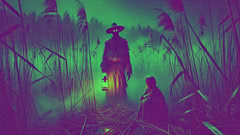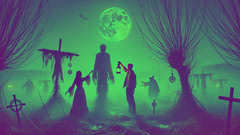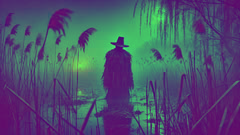Introduction
In the heart of South Bohemia, where rivers curl through emerald meadows and morning fog creeps in from the marsh, folklore lingers as heavily as the mist. Here, the boundaries between the seen and the unseen blur when the sun slips below the horizon. In this land, every knotted willow, every crooked barn, carries whispers of legends told beside the hearth—stories woven from the region’s ancient fears and fierce hopes. For generations, villagers of Sedlec remembered to bolt their doors at twilight and to hush their children with warnings: beware the sound of crying from the reeds, for not every wailing child is what it seems. These tales weren’t idle threats; they spoke of the Bubak—a scarecrow-like figure said to haunt the marshes beyond the last field, draped in tatters and crowned with a brimmed hat. The Bubak, it was said, could mimic the desperate cries of an infant, luring the unwary deep into fog and darkness. None who vanished to the Bubak’s call returned unchanged, if they returned at all. It was a story mothers used to keep children safe, but beneath the cautionary tone was a chill that even the old men wouldn’t laugh away. Now, as autumn’s breath stripped gold from the birches and the nights grew long, fear began to gnaw at the peace of Sedlec once more. A series of strange disappearances had unsettled the villagers. Livestock vanished. A local girl failed to return from berry picking. At dusk, some swore they heard a heart-wrenching cry echoing from the bog, a sound that tugged at the soul and sent the bravest running for home. Under the candlelit rafters of the tavern, suspicion bloomed: was it wolves, or something older, something from the shadows of their own childhood stories? Into this atmosphere of dread and uncertainty stepped Eliska Novak, a young woman raised by her grandmother on the edge of the marsh. Eliska was practical, headstrong, and never one to flinch at a bump in the night. She’d heard all the tales, recited them by memory, yet believed herself immune to such superstitions. But the marsh is a patient teacher, and as the Bubak’s legend wrapped tighter around Sedlec, Eliska would be forced to confront truths deeper and darker than she’d ever imagined. For in the Czech lands, legends are seldom just stories—they’re warnings, memories, and sometimes, living things.
The Marsh’s Shadow
Eliska Novak stood at the threshold of her grandmother’s cottage, hands sunk into the pockets of her patched skirt, gaze fixed on the trembling willows that fringed the marsh. The house, with its low timber beams and the earthy scent of peat, was a cradle of safety. But tonight, as the last of the daylight retreated behind the hills, the comfort felt brittle. The evening mist—so familiar since childhood—rolled in thicker than usual, swallowing the path to the village and muffling the world in silence, except for the occasional, distant cry. Her grandmother, Babicka Novakova, was bent over the stove inside, muttering prayers in a tongue older than Czech itself. Eliska had always dismissed such habits as the harmless relics of an old woman’s faith. But after Lena—the baker’s daughter—had vanished three nights ago, even Eliska felt the hairs on her arms rise at every creak and sigh from the marsh.

Babicka pressed a bowl of steaming potato soup into Eliska’s hands. “Eat. You’ll need your strength if you’re going to help the searchers tomorrow.”
Eliska nodded, forcing a smile. She’d volunteered to help comb the fields with the other young folk at dawn. Part of her wanted to find Lena, to ease the ache in the village. The other part—one she barely admitted to herself—hungered to prove that the disappearances had an ordinary explanation. Wolves. Thieves. Anything but the Bubak.
That night, sleep came late. Eliska tossed under her quilt, listening as the wind rattled the shutters. At the edge of wakefulness, she heard it: a thin, plaintive wail drifting through the dark. It was uncanny, wavering somewhere between a baby’s sob and a wounded animal’s cry. Her heart pounded. A memory surfaced—her mother, long dead, warning her never to answer cries from the marsh after dark.
Morning brought a brittle frost and sullen faces at the village square. Jakub, Eliska’s childhood friend, greeted her with a forced cheer. “Come on, Eliska. If Lena’s out there, we’ll find her.”
They split into groups, combing the fields and edges of the marsh. The search was methodical: calling Lena’s name, poking through thickets, checking for signs of struggle. But by noon, hope began to wane. Only the marsh itself seemed unchanged—vast, inscrutable, its reeds swaying with secrets.
In a cluster of birches at the edge of the bog, Eliska found something that stilled her breath: a child’s ribbon, blue and mud-smeared, snagged on a broken willow branch. She called for Jakub, and together they scoured the area. There were tracks—small, confused footprints that disappeared into the wet ground. No signs of Lena, just an overwhelming sense that something was watching.
Back at the village, rumors blossomed like fungi. Some blamed poachers; others whispered about a curse. The old men gathered in the tavern, their voices low and urgent: “The Bubak’s hungry again. We’ve forgotten the old ways.”
Babicka pulled Eliska aside that evening, eyes shining with a mixture of fear and resolve. “You must not go out after sunset, child. The Bubak is real, and he’s clever. He wears loneliness like a cloak. He’ll lure you with what you most wish to save.”
Eliska wanted to protest, but as darkness pooled at the windows and a faint sobbing echoed from the bog, her arguments dried up. That night, Babicka recited prayers at every threshold and hung garlic above the door. Eliska watched the mist curl around the cottage and wondered if there really was something beyond the marsh—something ancient, something hungry, waiting just beyond the reach of reason.
The Cry in the Fog
For days, Sedlec existed in a state of suspended fear. Each evening, as dusk deepened and villagers retreated behind locked doors, a spectral sobbing floated over the marsh. It was uncanny—too human to ignore, too chilling to believe. Some families whispered it was Lena herself, trapped by spirits or worse, begging for rescue. Others repeated what their grandparents had told them: the Bubak could sound like a baby in distress, a wounded fox, or even someone you loved. He was a master of voices, a trickster who played with sorrow and hope like threads on his loom.

Jakub tried to rally the younger villagers. “If there’s someone out there—Lena or anyone—we owe it to them to look.” But few dared to join him after sundown. Eliska, torn between courage and caution, spent her days helping Babicka and her nights staring into the mist. Sleep eluded her; she’d wake with her sheets tangled, the ghost of a cry lingering in her ears.
One evening, as a storm rolled in from the east, Eliska found herself standing by her bedroom window, drawn by a sound she’d convinced herself was just the wind. Yet this time, it was different. The cry was closer, clearer—a raw, desperate plea.
She moved through the dark house, careful not to wake Babicka. Outside, the wind was cold, but the cry tugged at her with impossible insistence. Her feet carried her past the woodpile, down the sodden path to the marsh. Each step felt like a crossing—between safety and danger, belief and doubt.
As she reached the edge of the reeds, Eliska saw a flicker of movement—a pale shape darting between willow trunks. Heart thundering, she called out, “Lena? Is that you?”
The answer was another wail, brittle with fear. Against her better judgment, Eliska pressed on. The marsh swallowed her in fog; the air tasted of rot and old water. Suddenly, her foot snagged on something buried in mud. She pitched forward, hands sinking into black ooze. When she looked up, she realized she was not alone.
A figure stood before her: tall, impossibly thin, its form a patchwork of tattered cloth and broken straw. Its head was crowned with a battered hat, its face lost in shadow. Yet its eyes—if they could be called that—shone with a faint, unnatural light. In its arms it cradled a bundle, swaddled like an infant.
Eliska could not move. The creature swayed, its voice keening. The wail grew louder, wrapping around her mind, filling her with sorrow so deep it threatened to drown her.
Then something snapped inside her—a memory of her mother’s voice, sharp and loving: “Never answer what calls from the marsh.” She tore her gaze away and scrambled backward, mud splattering her dress. The creature’s cry rose to a scream, and for a moment, it seemed as if the reeds themselves twisted in agony.
Eliska stumbled into the clearing by her grandmother’s house, breathless and shaking. She glanced back—nothing but mist and silence. She slammed the door and bolted it fast, then wept as Babicka held her.
For days afterward, Eliska was haunted by the memory—the straw hands, the weeping bundle, the darkness behind those strange eyes. She wondered if Lena had faced the same thing. And she realized with cold certainty: if they were to save the missing and themselves, someone would have to confront the Bubak directly, not just with prayers and charms, but with understanding. The marsh hid its secrets well, but perhaps there was a reason the Bubak cried—and perhaps there was a way to end its hunger forever.
Beneath the Willow Moon
A week passed with no sign of Lena or the others who’d vanished. Villagers grew restless; a cold wind carried rumors from door to door. The priest visited every home, sprinkling holy water and muttering prayers. Old women hung herbs in windows and children were kept indoors. Yet each dusk, the marsh wailed.

Eliska spent her days quietly gathering information. She questioned shepherds who tended flocks near the bog and spoke with elders who remembered leaner times. She listened for patterns: where the cries seemed loudest, where cattle disappeared, when the fog rolled thickest. She mapped it all on a scrap of parchment—lines crisscrossing like veins on an ancient hand.
One afternoon, Jakub found her sitting by the well. "You’ve heard it too, haven’t you? The cry?" he asked gently.
She nodded, unable to meet his eyes. "I saw him, Jakub. The Bubak. Or something that wore his shape." She described what she’d seen—the tattered clothes, the bundle, the eyes that glimmered like marshfire. Jakub listened without laughter, only fear.
They resolved to seek help from Marta Jandova, an old wise woman who lived beyond the last mill. Marta was feared and respected—a healer who knew both prayers and curses. Her house stood alone at the forest’s edge, roof heavy with moss.
Marta welcomed them with herbal tea and a sharp glance. "The Bubak is older than this village," she said. "He is born from loss. Sometimes he is a man turned monster by grief. Sometimes he is only fear given form. He lures with what people most want to save—the sound of a crying child, a lost lover’s voice."
She pressed a bundle into Eliska’s hands: dried wolfsbane, hawthorn twigs, and a small silver bell. "If you must face him, do not listen to his voice. Trust only what you see with your own eyes. And never follow him alone."
That night, under a moon swollen and pale as bone, Eliska and Jakub crept to the marsh’s edge. The fog licked their ankles, dense and chill. Jakub carried a lantern; Eliska clutched Marta’s talismans.
The crying started before they reached the first willow: soft, pleading, then rising in pitch. It seemed to come from everywhere and nowhere at once. Jakub faltered, but Eliska pressed on, heart thundering.
In a hollow between twisted trees, the Bubak appeared—drawn from darkness like a figure sketched in charcoal and shadow. He cradled his bundle and wept. The air felt thick, every breath heavy with sorrow not their own.
Eliska forced herself to look—not at the bundle or the face, but at the ground beneath its feet. There, tangled in roots, she saw scraps of fabric and a locket glinting faintly. She recognized Lena’s ribbon knotted around a straw finger.
She rang the silver bell. The sound sliced through the marsh’s gloom, clear and cold as starlight. The Bubak recoiled, his wail faltering. Jakub raised his lantern, and for a moment, light illuminated what lay beneath the rags: a skull not of bone, but of knotted roots and earth. Its eyes—empty, yet sorrowful—reflected every grief Sedlec had buried in its soil.
Eliska felt a wave of compassion as much as fear. She stepped forward and spoke—softly, firmly—"You cannot have us. We will not follow you. But you can rest. You are not forgotten."
The creature stilled. The bundle in its arms dissolved into mist, unraveling like fog at sunrise. With a last, shuddering sigh, the Bubak faded, leaving behind only silence and a faint scent of damp earth.
Eliska and Jakub collapsed in relief. The marsh was quiet—peaceful for the first time in weeks. They found Lena’s locket among the roots and carried it home.
The next morning, sunlight burned away the last of the mist. Sedlec’s people emerged from their houses, blinking in wonder at the hush that had replaced the nightly cries.
The legend of the Bubak was not forgotten, but it lost its power to terrify. In time, children played at the marsh’s edge again, watched carefully by mothers who remembered both fear and hope. And Eliska kept Marta’s bell beside her bed—a reminder that even in the darkest stories, there is a way to break the spell.
Conclusion
The story of Sedlec and its Bubak became part of local lore—no longer just a threat whispered to frighten children, but a lesson about grief, memory, and courage. Eliska grew into her place as a guardian of her village’s traditions, teaching others to listen for the truth behind every legend. The marsh remained mysterious, yet its dangers seemed less menacing now that people understood their source: sorrow unspoken, fears unacknowledged, the ache for lost things. The villagers never forgot to honor their dead or to watch out for each other when nights grew long. Each spring, they hung garlands from the willows and left bread at the marsh’s edge—not in fear, but in respect for what had passed. And sometimes, when fog blanketed the land and a lonely wind carried echoes from the reeds, they remembered Eliska’s bravery and whispered thanks that even the darkest shadow can be faced with compassion and resolve. The Bubak’s cry faded into legend, leaving Sedlec forever changed but no longer afraid.













